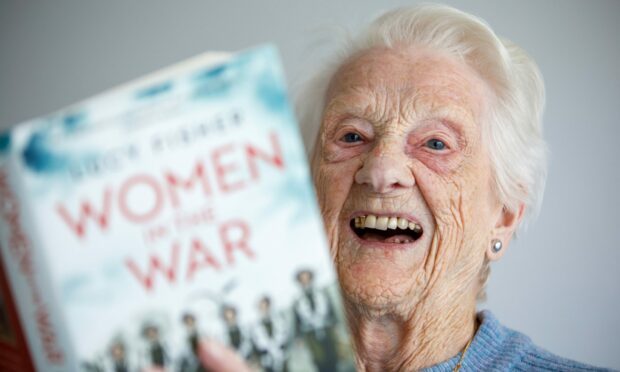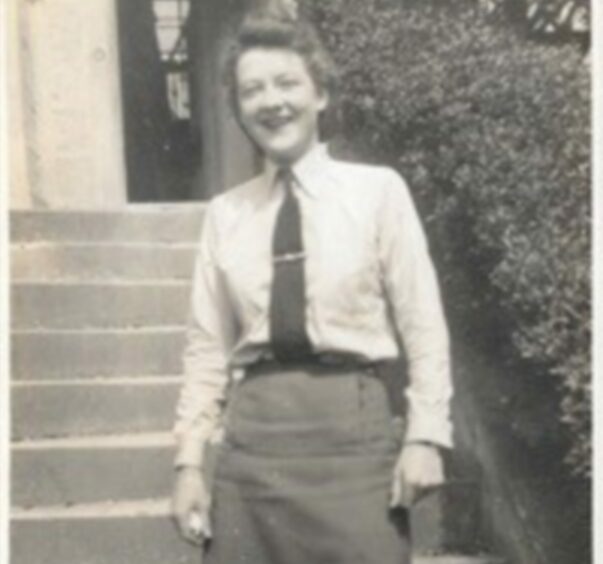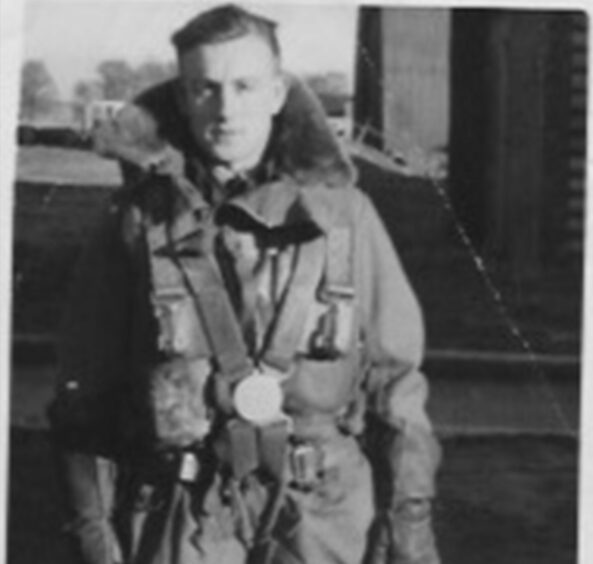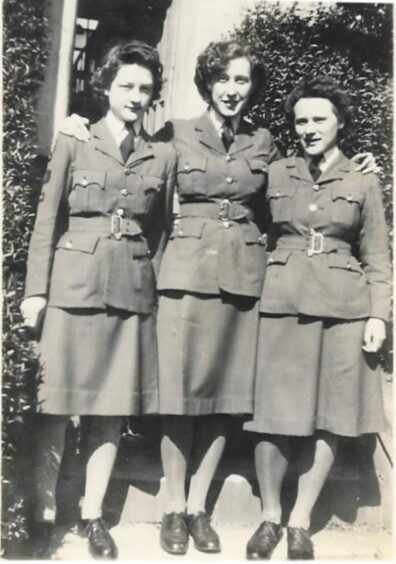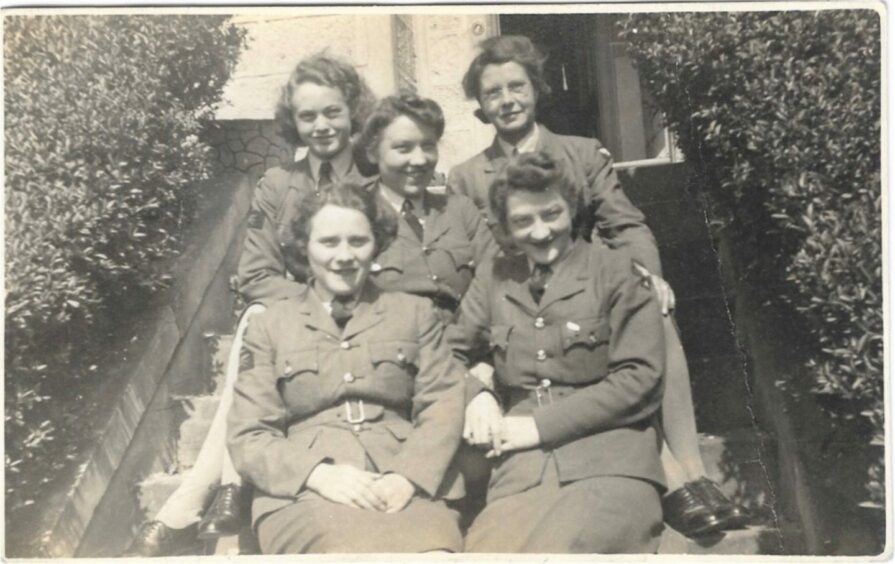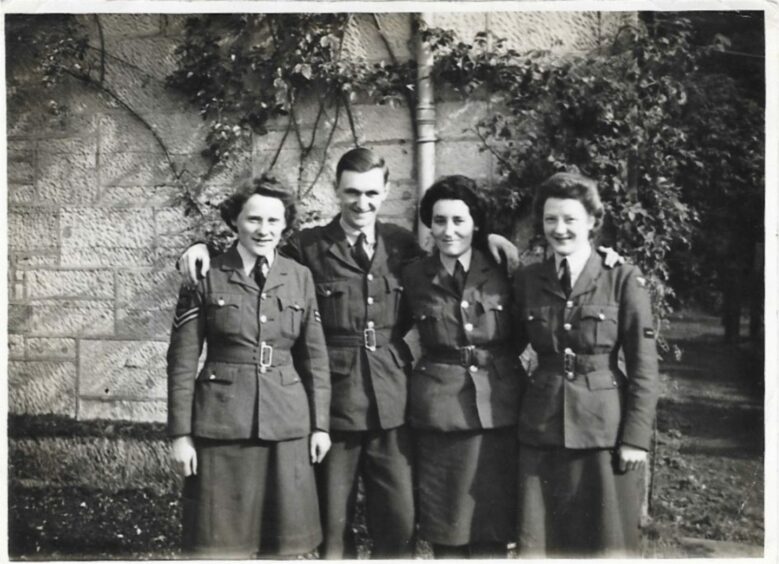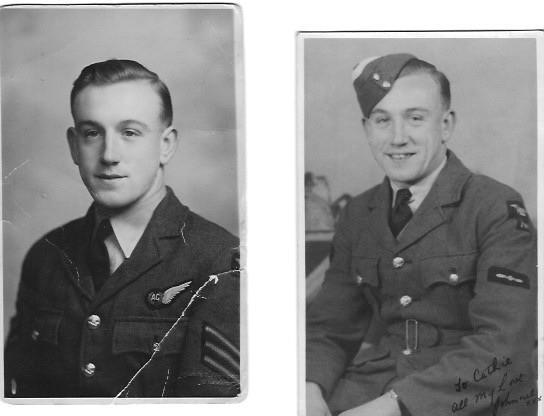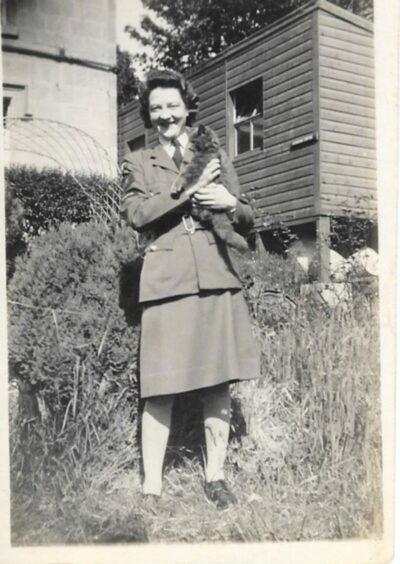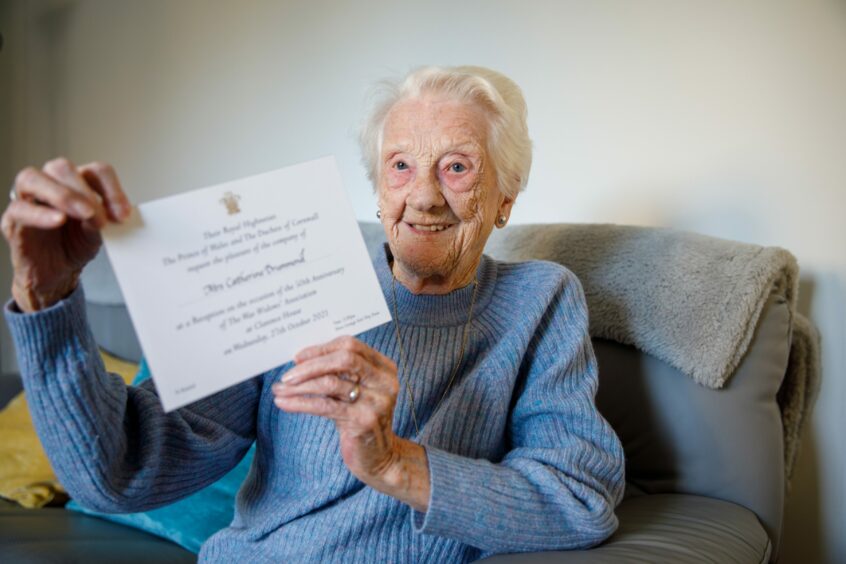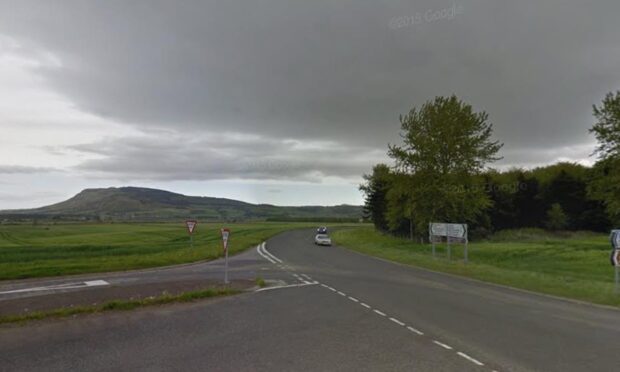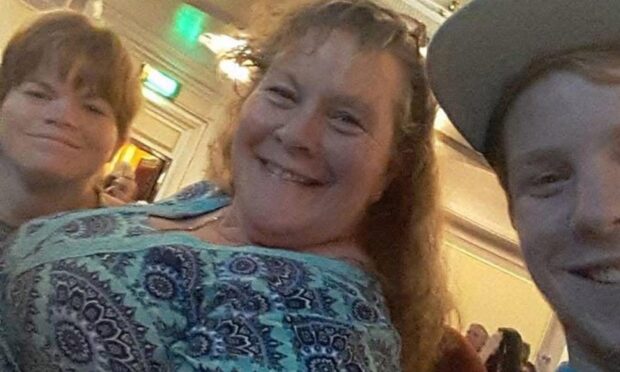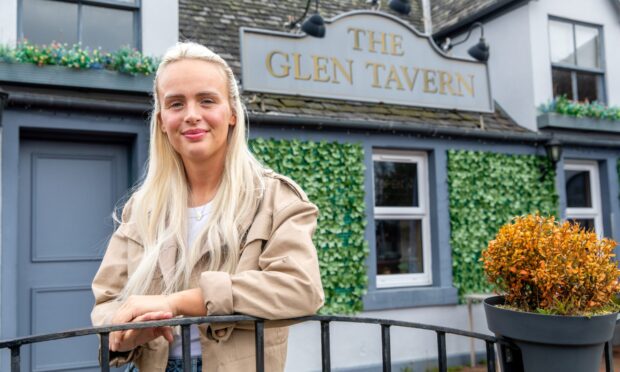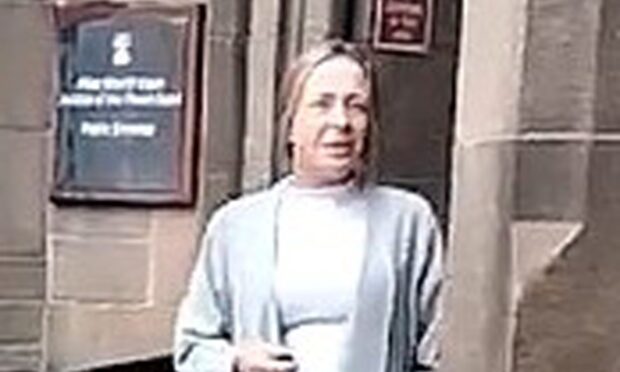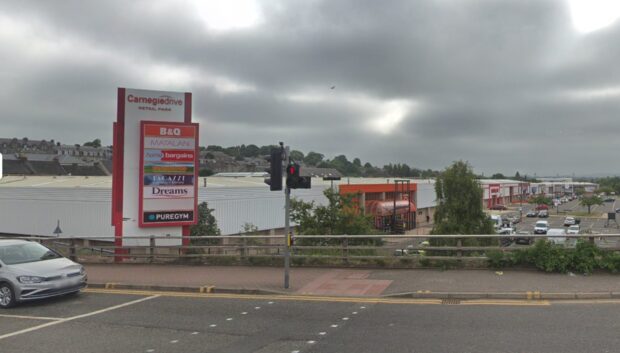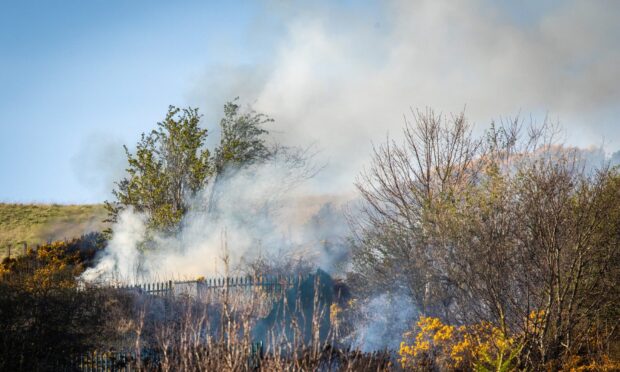Michael Alexander meets 99-year-old former Second World War wireless operator and Fife great grandmother Cathy Drummond who became a war widow aged just 22 while pregnant with an unborn child.
When 99-year-old Fife great grandmother Cathy Drummond was invited to Clarence House in London the other week for an audience with Prince Charles and the Duchess of Cornwall, the future king listened intently as she told him the remarkable story of how she was on duty as a wireless officer the night the Duke of Kent’s plane came down during the Second World War.
On August 25 1942, four months short of his 40th birthday, Prince George, who was King George VI’s younger brother, was killed when the RAF S. 25 Short Sunderland Mark III flying boat he was in crashed into a hillside near Dunbeath, Caithness, in the far north of Scotland.
Attending an event organised by the War Widows, Cathy, who served with the Women’s Auxiliary Air Force, explained how she and her friend Margaret, from Kirkcaldy, were on duty that night at a wireless station in Oban.
The Duke of Kent was being transported from Easter Ross to Iceland when disaster struck.
“We got this message through to say that there was a plane in trouble,” recalls Cathy.
“We didn’t know at the time who it was. I was the one taking the messages then all of a sudden the ‘big brass’ all came in and were standing behind me, as the wireless operator on the plane was sending messages.
“I was giving the Morse code messages to send back, then all of a sudden silence. We knew the plane had crashed and the officers behind just walked out.”
War widow at 22
Cathy, who attended the Clarence House reception with her daughter Catherine, said Prince Charles thanked her for sharing the story about his great uncle.
However, he was also interested in Cathy’s own experience of wartime tragedy that saw her get married at the age of 21 – and become a war widow at the age of just 22 with an unborn child.
Cathy had enjoyed just 10 months of marriage to John Boyd, a dashing Northern Irish RAF gunner, before his plane crashed off the coast of Italy in 1944.
It was a devastating shock for the young woman, who was forced to bow out of the war effort as the birth of her daughter drew near. Catherine, of course, also never got the chance to meet her dad.
With Remembrance Sunday upon us, Cathy says she always finds it a “sad time”.
She often wonders what her life would have been like if John had come home.
Having been involved with the War Widows for decades, she’s met many young widows in recent years who’ve lost their husbands and partners in theatres of war including Afghanistan and Iraq.
In spite of everything, however, Cathy, who is now registered partially blind, still manages to retain a sense of humour – something that is evident when The Courier catches up with her and her daughter at their home in Freuchie.
War time service
Having left school at 14, Cathy was working as a nanny at the Old Manor House Hotel in Bridge of Allan when, aged 19 and “looking for a change”, she signed up for the war effort.
“I saw an advert in the Daily Record,” says the Coatbridge-born 99 year old, whose younger brothers Charlie and John later signed up for the Black Watch and Royal Navy respectively.
“They were looking for motor mechanics. But I didn’t know a thing about motor mechanics!” she laughs.
“Anyway, I applied and right away I was taken. I had to go to the labour exchange in Stirling and do all the paraphernalia.
“Then I got word to say I had to go to Innsworth in Gloucester.
“I gets the train down. By this time it was dark at night. This huge army lorry was sitting waiting for us and we were all herded on like cattle.
“We got into our billets – there was all these beds with three mattresses. The WAAF person said ‘now you don’t have to get up early tomorrow because you’re late tonight’. Six o clock the next morning the call came! ‘Out’!”
During her interview, Cathy was told there were no vacancies for mechanics. However, they were looking for wireless operators.
After passing a spelling test, she embarked upon a fortnight’s “square bashing” in Gloucester when she was issued with her uniform, given vaccinations and taught to march.
Recalling blisters, terrible period pain and feeling incredibly homesick, she was posted to Long Benton outside Newcastle to train as a wireless operator.
After six “difficult” months learning Morse Code, she was then posted to Blackpool where a further six weeks square bashing followed.
“It was the most miserable time because the landladies did not want anything to do with the forces,” she says, adding that the only silver-lining was getting into the famous Blackpool ball room for 8p in old money.
Date at the pictures
It was when she was posted to Coastal Command at Oban – home to 228 Squadron and its Sunderland flying boats – that she met her husband to be John, from Derry in Northern Ireland.
“He arrived one day in the room and he asked me out to the pictures,” she smiles.
“From then on that was that. He wanted to fly so he was posted away to different parts of England to be a wireless operator air gunner.”
Marriage
When John found out he was being posted abroad, they decided to get married at the Holy Trinity Church in Stirling.
While John returned south, Cathy came back off marriage leave to discover she was being posted from Oban to Alness, near Invergordon.
“It was dreadful,” she recalls. “It was snowing, freezing cold. When you went out to wash yourself, you only washed your face, it was so cold,” she laughs.
Not too familiar with the “birds and the bees”, after fainting twice on parade at Alness and receiving little sympathy from her officer known as the “Queen Bee because she was such a horror”, she was sent to hospital at Invergordon where a navy doctor confirmed she was pregnant. She received little sympathy there either, however.
“The doctor took me into his office after the examination and he tore me to bits that I had the audacity to get pregnant when there was a war on and the government had paid all this money out to train me,” she recalls.
“I came away from there with the tears running down my face and I’m saying to myself ‘I’m a married woman!’. It was horrible. But my officer kept me and finally I got my discharge and came home.”
Back with her parents in Bridge of Allan, Cathy went down to Melton Mowbray in Leicestershire to see John before he flew abroad.
Standing at the door of her digs, and pregnant, when the plane carrying John took off, the pilot dipped the wings to say farewell.
She didn’t know it at the time, but that was the last she’d ever see her husband, because just 10 months after they married, he was killed off Italy. He has no known grave, but his name is on the war memorial in Malta.
“On the May 25 1944 he was posted abroad – I didn’t know where,” recalls Cathy.
“On August 25 he was reported missing, assumed killed. On September 25, Catherine was born in Stirling Royal Infirmary. It was a very difficult time. It was heart breaking.”
Raising her daughter
Back in Bridge of Allan, Cathy worked long hours in a paper shop by day and waitressed in hotels by night.
She later got a job with United Glass, pricing the whisky bottles bound for the big distillers.
“I never even got a taste!” she laughs, complaining that the “lousy shower” of a government started taxing her £4 a week pension as unearned income when she started working.
Cathy, who got together in later life with a “lovely man” called Alastair Drummond, says there’s no doubt Catherine missed out on not having a dad. Catherine reveals she was sometimes bullied at school.
But this also made her more resilient and the extra money earned by Cathy helped put her daughter through commercial school to get a decent job.
Although John’s parents decided Cathy “wasn’t the girl for their son”, Catherine got to know her cousins through annual visits to Northern Ireland.
Most of them moved to Australia – a country to which Cathy has visited nine times, as well as Canada three times and other destinations including Malta, USA and Bali.
“I’m on my fourth passport!” she smiles proudly, revealing that she’d love to visit Australia again for her 100th birthday next April.
Secret of a long life?
Cathy puts the secret of a long life down to “hard work and good health – and a whisky now and again”.
With her story featured in a book published earlier this year by Lucy Fisher and a foreword by Andrew Marr, and recent publicity by the Royal British Legion Scotland, however, she laughs: “Fancy getting to this age to be famous!”
